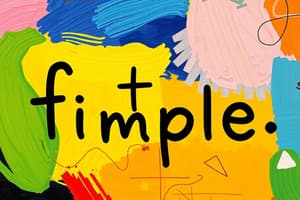Podcast
Questions and Answers
What is the primary focus of the text?
What is the primary focus of the text?
- Reviewing the Perfect Tense
- Discussing the Future Simple tense for spontaneous decisions (correct)
- Analyzing the Present Continuous tense
- Exploring the Past Simple tense
Which auxiliary verb is commonly used with the Future Simple tense?
Which auxiliary verb is commonly used with the Future Simple tense?
- has
- am
- will (correct)
- was
What type of decisions does the Future Simple tense for spontaneous decisions convey?
What type of decisions does the Future Simple tense for spontaneous decisions convey?
- Well-planned decisions
- Past decisions
- Random decisions
- Spontaneous decisions (correct)
Which of the following sentences demonstrates a spontaneous decision using the Future Simple tense?
Which of the following sentences demonstrates a spontaneous decision using the Future Simple tense?
In expressing spontaneous decisions, what does 'No Search' feature in artificial intelligence allow users to do?
In expressing spontaneous decisions, what does 'No Search' feature in artificial intelligence allow users to do?
Which of the following scenarios is NOT an example of using Future Simple for spontaneous decisions?
Which of the following scenarios is NOT an example of using Future Simple for spontaneous decisions?
What does the phrase 'We'll go for a walk if the weather's nice' suggest about the decision?
What does the phrase 'We'll go for a walk if the weather's nice' suggest about the decision?
Which tense is used in the sentence 'She is going to take the exam next week'?
Which tense is used in the sentence 'She is going to take the exam next week'?
What distinguishes using Future Simple for spontaneous decisions from using it for scheduled events?
What distinguishes using Future Simple for spontaneous decisions from using it for scheduled events?
What role does 'No Search' play in web searches according to the text?
What role does 'No Search' play in web searches according to the text?
Flashcards are hidden until you start studying
Study Notes
Unlocking Future Simple for Spontaneous Decisions
When it comes to conveying actions that are yet to happen, the Future Simple tense is a staple in English grammar. But today, we'll be focusing on a particular use of this tense: expressing spontaneous decisions.
Future Simple Definition
The Future Simple tense is the most basic form of future tense in English, where the verb remains in its base form and is conjugated with the auxiliary verb "will" or "be going to." For example:
- I will go to the store tomorrow.
- She is going to take the exam next week.
Using Future Simple for Spontaneous Decisions
The Future Simple tense is not just for scheduled or planned events. It can also be used to convey spontaneous decisions. Here are some examples:
- "I'll call my friend if I remember something important."
- "We'll go for a walk if the weather's nice."
- "I'll help you with that if I have some free time."
These statements imply a momentary decision made at the time of speaking, rather than a pre-determined plan.
"No Search" for Instant Answers
A great example of spontaneous decisions in a different context comes from the world of artificial intelligence. Microsoft Bing introduced a feature called "No Search," which allows users to opt out of web searches when asking questions, providing instant answers without the delay of a web search. This feature can be particularly useful for users seeking help with complex math problems, coding, or casual conversations, where searching the web might not be necessary or beneficial.
Conclusion
The Future Simple tense is a versatile tool for expressing actions that are yet to happen, including spontaneous decisions. Understanding how to utilize this tense appropriately not only enriches your writing and communication skills but also enhances the clarity of your messages. By mastering this tense, you'll be able to convey actions that occur at the moment of speaking with precision and confidence.
Now, go forth and confidently use the Future Simple tense to capture spontaneous decisions in your conversations and writing!
Studying That Suits You
Use AI to generate personalized quizzes and flashcards to suit your learning preferences.




